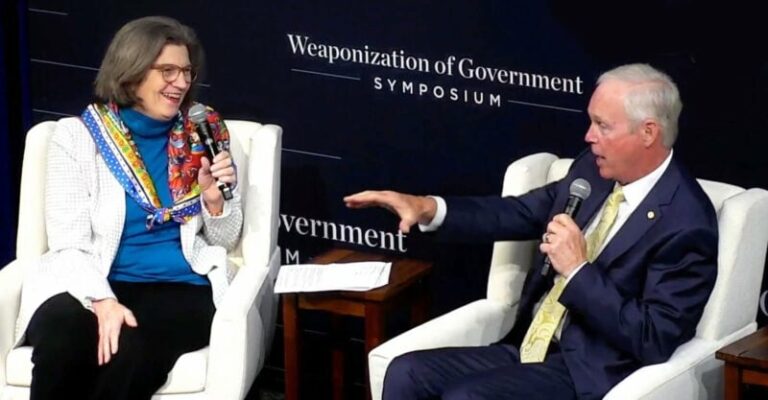Kids Ages 2-5 Had Higher Rate of Convulsions After mRNA COVID Shots
According to FDA researchers, the higher rate of febrile seizures from the mRNA COVID-19 vaccines “is not large compared to some other vaccines and combinations of vaccines” that can cause seizures at higher rates.
Children ages 2-5 who received the COVID-19 mRNA vaccine faced an increased risk of febrile seizures immediately following vaccination, according to a new study led by researchers at the U.S. Food and Drug Administration (FDA).
The preprint study found children who received the Moderna shot were 2.5 times more likely to have a febrile seizure within a day of being vaccinated than they were to have one between eight and 63 days following vaccination.
The incidence rate ratio was “significantly elevated,” the researchers wrote, but the “absolute risk” — the risk of having a seizure following vaccination, was low within the first day following vaccination.
FDA researchers also found a higher risk of febrile seizures among children ages 2-4 on the first day following the Pfizer vaccine than in the 8-63 days following vaccination. However, that increased risk was not statistically significant, the researchers reported.
“Based on the current body of scientific evidence, the safety profile of the monovalent mRNA vaccines remains favorable for use in young children,” the researchers concluded.
Dr. Michelle Perro, a pediatrician and co-author of “What’s Making our Children Sick?” told The Defender that the way the authors mixed different measures of risk in their reporting obfuscated the findings.
“This paper buried itself in statistical gymnastics and made it difficult to assess their true findings,” despite their claim that the safety profile remains favorable, Perro said.
“Based on their own data, I would advise that this vaccination is risky due to the probability of the occurrence of non-febrile seizures in a small population of vaccinated children, along with the fact that we don’t know what other future effects might be,” Perro said.
The FDA’s Richard A. Forshee, Ph.D., led the team of researchers who came largely from commercial health claim database companies — Carelon Research, CVS Health and Optum — that contributed data to the analysis.
Safety signal led to study
After the FDA authorized Pfizer and Moderna’s COVID-19 vaccines in June 2022 for emergency use in children ages 6 months and older, the agency’s Center for Biologics and Evaluation Research conducted the mandatory near-real-time safety monitoring.
The agency detected a signal for seizures/convulsions after both one and two doses of the vaccines among children ages 2-5 who received the Moderna vaccine and children ages 2-4 who received the Pfizer vaccine.
Further evaluation of the signal was necessary, the researchers wrote, because the agency’s surveillance was “designed to be sensitive but not specific for screening and detection purposes.”
The FDA had monitored seizures/convulsions for seven days following vaccination and found that febrile seizures were the most common event, so they made those the primary object of analysis.
Forshee and his team analyzed data on COVID-19 vaccination and medical claims regarding seizures among children ages 2-5 from several medical claims databases.
The study excluded children who had received more than the recommended number of vaccine doses. All study periods began when the vaccines were authorized for children in June 17, 2022.
The data from the Carelon database extended through Feb. 4, 2023. The CVS database extended through March 26, 2023, and the Optum database extended through May 20, 2023.
The research examined only the original emergency use authorized monovalent vaccines.
The CDC now recommends that children ages 6 months to 4 years get two to three doses of the updated Moderna or Pfizer vaccines and children ages 5 and up get one dose.
‘There ought to be an unvaccinated control group’
The study was “self-controlled,” meaning the researchers compared the likelihood of a child having a febrile seizure on the day of or the day following vaccination to having one later, in the 8-65 days following vaccination.
That two-day window was selected as the time a seizure would most likely be associated with vaccination rather than other causes.
In total, 288,754 Pfizer shots and 192,540 Moderna shots were administered to children in the study group.
Eighty-eight cases of febrile seizures occurred following the Pfizer vaccine and seven of those occurred within the two-day window being analyzed.
There were 67 cases of febrile seizures following the Moderna vaccination and 10 of those happened within the two-day window. A higher proportion of the febrile seizures occurred among 2-year-olds compared to all other groups.
The researchers excluded seizures that happened between 2-7 days from the primary analysis.
Perro said it was noteworthy that the overwhelming majority of cases occurred during the control interval (days 8-63) and this pattern was observed with both types of mRNA vaccinations.
“This in itself is concerning,” she said.
The authors also included a secondary analysis using a longer risk interval of 0-7 days following vaccination. They found 103 cases of febrile seizures and 135 cases of seizures/convulsions observed following the Pfizer vaccine. Of those, 22 of the febrile seizures and 32 cases of seizures/convulsions happened within seven days following vaccination.
There were 78 cases of febrile seizures and 106 cases of seizures/convulsions following the Moderna vaccine. Of those, 21 febrile seizures and 28 cases of seizures/convulsions happened within the first seven days.
These secondary results, they wrote, were not “statistically significant.”
“The majority of the seizures as per their own data are occurring after the fevers, so by definition, they are not febrile seizures, but seizures,” Perro said.
“The sequelae of having a febrile seizure and a non-febrile seizure are clinically very different, with unknown ramifications for the future of the child,” she added.
Brian Hooker, Ph.D., chief scientific officer for Children’s Health Defense and co-author of “Vax-Unvax: Let the Science Speak,” also had serious concerns about the study’s methods and findings. He told The Defender the study was “a hot mess.”
First, he said, it was not appropriate to do a “self-controlled study” to determine whether seizures were associated with two experimental vaccines. There ought to be an unvaccinated control group, he said.
The statistically significant result for the Moderna vaccine is “extremely shocking and would perhaps be more dramatic if the study was appropriately controlled.”
As for the Pfizer vaccine, Hooker said the inconclusive results “belie the limited statistical power of this type of study,” rather than indicate anything about the actual risk.
He also said, “Any febrile seizure even within the control window which extends out to 63 days is notable and can’t be dismissed as ‘unrelated to the vaccine.’”
The researchers noted that “febrile seizures occur at a rate of up to 5% in young children” and that the increased rate they found from the mRNA COVID-19 vaccines “is not large compared to some other vaccines and combinations of vaccines” that can cause seizures at higher rates.
The authors noted the “significantly increased incidence” following Moderna’s shot but not Pfizer’s could indicate that, “the difference in formulation of the two vaccinations may yield a different immune reaction.”
Forshee did not immediately respond to The Defender’s request for comment.
Suggest a correction







